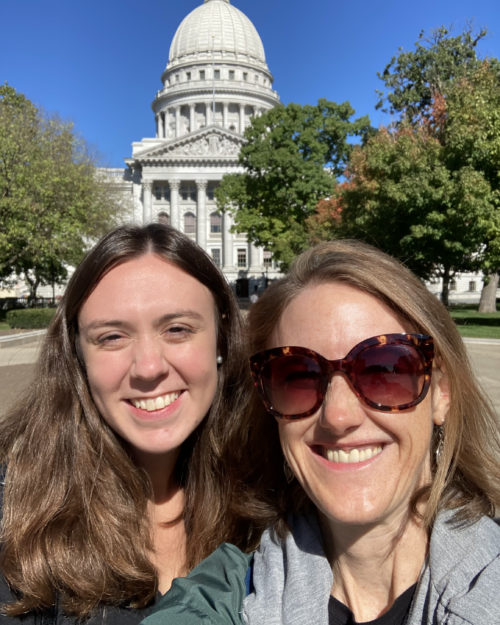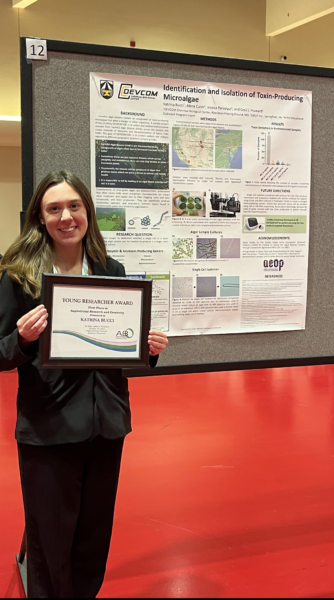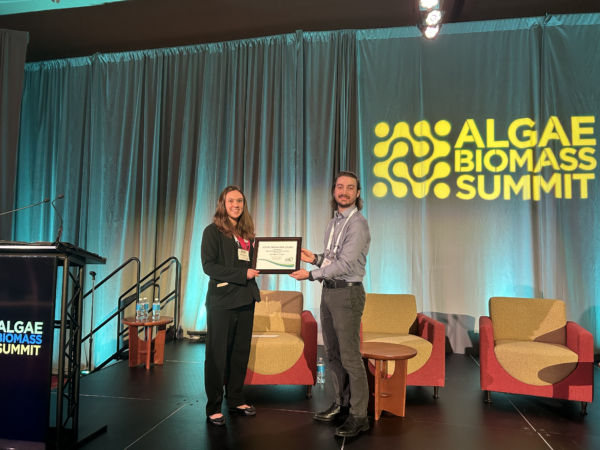December 5, 2023

We had the opportunity to speak with Katrina Bucci, a recent graduate from the University of Maryland, Baltimore County (UMBC), whose passion for biological sciences led her to a remarkable experience with AEOP’s Apprenticeships program. Join us as we delve into Katrina’s innovative research aimed at enhancing the safety and health of both soldiers and civilians, and explore her professional adventures.
When did you first get involved with AEOP, and what motivated you to participate?
I first got involved in AEOP in the summer of June 2023. I heard about AEOP through my father, who works for the government at the Edgewood area base in Aberdeen Proving Ground, Maryland. A friend of mine also completed an AEOP Apprenticeship over the summer and recommended it to me. I also knew that, through this experience, I would be introduced to a new area of research that supported the safety and health of soldiers who are of vital importance in serving our nation.
Following my summer experience with AEOP, I was able to extend my Apprenticeship, and I am currently supporting the biomanufacturing efforts of the branch. One of my projects involves bioengineering a phage to display a fluorescent protein and be able to appear a certain color in the presence of Bacillus bacterial strains.
Why did you choose AEOP Apprenticeships, and what site did you participate in?
I wanted to be an AEOP Apprentice because I knew I could gain hands-on biological research experience under the direction of a mentor. I work for the U.S. Army DEVCOM Chemical Biological Center in Aberdeen Proving Ground, Maryland.
AEOP’s Apprenticeships also offered me a myriad of networking opportunities, skill-building workshops, and career webinars to connect me with scientists in my field of interest and further my professional development. Additionally, I find fulfillment in contributing to the innovations and scientific discoveries that benefit the nation and the well-being of soldiers and civilians.
 What did your research focus on during your AEOP Apprenticeship?
What did your research focus on during your AEOP Apprenticeship?
My research focused on isolating and identifying toxin-producing microalgae. We collected environmental samples from various locations in the United States that reported harmful algal blooms. The goal was to determine whether a single cell of a toxin-producing algal sample could be isolated to produce a unialgal toxin-producing culture. The overall goal of DEVCOM-CBC is to protect soldiers and civilians exposed to harmful algal blooms.
How did the AEOP Travel Award support you academically?
The AEOP Travel Award offered me the opportunity to connect with other scientists at the Algae Biomass Summit. I learned about the diverse uses of algae in various industries and received valuable feedback on my research. The experience broadened my academic knowledge and increased my interest in algae research for future endeavors. I learned about the countless uses of algae, such as to create fuel, cosmetics, clothing and fertilizer. For example, in one of the projects, I learned about the value of utilizing giant kelp to make health products, including foods and diabetic treatments. Giant kelp can fulfill these diverse industrial applications, as it contains all the essential amino acids to be used in the food industry. It also exhibits bioactivity, with potent a-glucosidase inhibitory activity, to manage type 2 diabetes.
What’s one of your favorite memories from your AEOP Apprenticeship?
One of my favorite memories was successfully isolating a single cell of algae with my mentor, Alena Calm. Single cell isolation is a very difficult skill to master, so it took practice and several attempts to isolate a cell. When we were successful in our attempt, we were both ecstatic. The excitement and fulfillment of mastering a challenging technique were unforgettable.
Another favorite memory was when I was able to travel to Madison, Wisconsin to present my poster at the Algae Biomass Summit. Not only did I win the Young Researcher Award: First Place in Aspirational Research and Creativity, but I also had the opportunity to network with scientists and gain feedback on my research project. Additionally, I was able to explore Madison, a city that I had never visited. I am very grateful to have taken advantage of this opportunity due to the funding provided by AEOP.
What’s the most important thing you’ve learned along the way after participating in an AEOP Apprenticeship?
Don’t be afraid to ask questions and soak in as much knowledge as possible. There are many individuals who work in my branch who are very willing to answer my questions and ensure my success in the job.
The purpose of AEOP’s Apprenticeships is to develop one’s laboratory skills as well as one’s abilities to communicate and work effectively with other scientists. Therefore, it is important to be involved in as many tasks as possible to learn the skill sets and requirements of the position. Apprenticeships are also meant to allow one to practice networking and learn about opportunities of interest for one’s future career. I learned the importance of connecting with my coworkers and learning about their work, as well as about the work of other individuals outside of my branch. My coworkers can then connect me with other individuals who can be a resource for me for next steps in my career, such as learning about options for graduate school or organizations that are hiring for job positions after my Apprenticeship. It is important to be open to any opportunities that arise, such as traveling and presentation opportunities, because these will support your professional and academic journey.
How has AEOP helped you both professionally and personally?
AEOP has enhanced my professional skills, including critical thinking, communication and organizational abilities. It provided opportunities to present my research, receive feedback from experienced scientists and expand my network. Personally, it increased my confidence, pushed me out of my comfort zone and confirmed my passion for molecular biology research and how my research can support the safety and health of individuals.
 During the Algae Biomass Summit in Wisconsin, I was able to practice my public speaking skills and gain insight into different perspectives and ideas from various scientists on improving my research methods. For example, I learned about using a different type of microscope that can characterize algae in real time. The scientists’ feedback was very beneficial for my future research. It also helped me grow as a scientist as I was introduced to new methods and ways of thinking to combat the challenges I face in my research.
During the Algae Biomass Summit in Wisconsin, I was able to practice my public speaking skills and gain insight into different perspectives and ideas from various scientists on improving my research methods. For example, I learned about using a different type of microscope that can characterize algae in real time. The scientists’ feedback was very beneficial for my future research. It also helped me grow as a scientist as I was introduced to new methods and ways of thinking to combat the challenges I face in my research.
What are your future goals and dreams, both academically and professionally?
In the future, I aspire to continue molecular biology research, focusing on biotechnology or biomedical research for the government and help solve scientific problems that benefit the safety and health of soldiers and civilians. I also hope to pursue a master’s degree in biological sciences or biotechnology to further my education and contributions to the field.
Any advice for students interested in applying to AEOP’s Apprenticeship or STEM programs?
Apply for an AEOP offering because it exposes you to real-world research and hands-on experience under a knowledgeable mentor! Take advantage of the resources provided, participate in workshops and network with scientists and experts in the field. They can serve as mentors and help guide your academic and professional choices. Do not hesitate to ask questions and get involved in hands-on work — these experiences will benefit your future career!
Anything else you’d like to share about your AEOP Apprenticeship experience?
The AEOP Apprenticeships program has been a transformative experience, helping me understand professional expectations, expand my research knowledge and boost my personal and professional growth. I want to give a special thanks to my mentor, Alena Calm, for her support and encouraging me to apply for the AEOP Travel Award. Attending the Algae Biomass Summit and presenting my poster were truly rewarding experiences.
Learn more about AEOP’s Undergraduate Apprenticeships here.

Undergraduate Internships
Undergraduate students have the unique opportunity to conduct real-world, U.S. Army-sponsored research alongside scientist and engineer mentors in world-class facilities at university labs or U.S. Army Research Laboratories and Centers.
More About Undergraduate InternshipsFind a Volunteering Opportunity
Visit our Program Volunteers page for a tool to find the best opportunity for you.
eCYBERMISSION Mini-Grant
The eCYBERMISSION Mini-Grant is intended to support teachers/program leaders as they implement eCYBERMISSION with their teams. Educators (formal and informal) of students in grades 6-9 are encouraged to apply.
